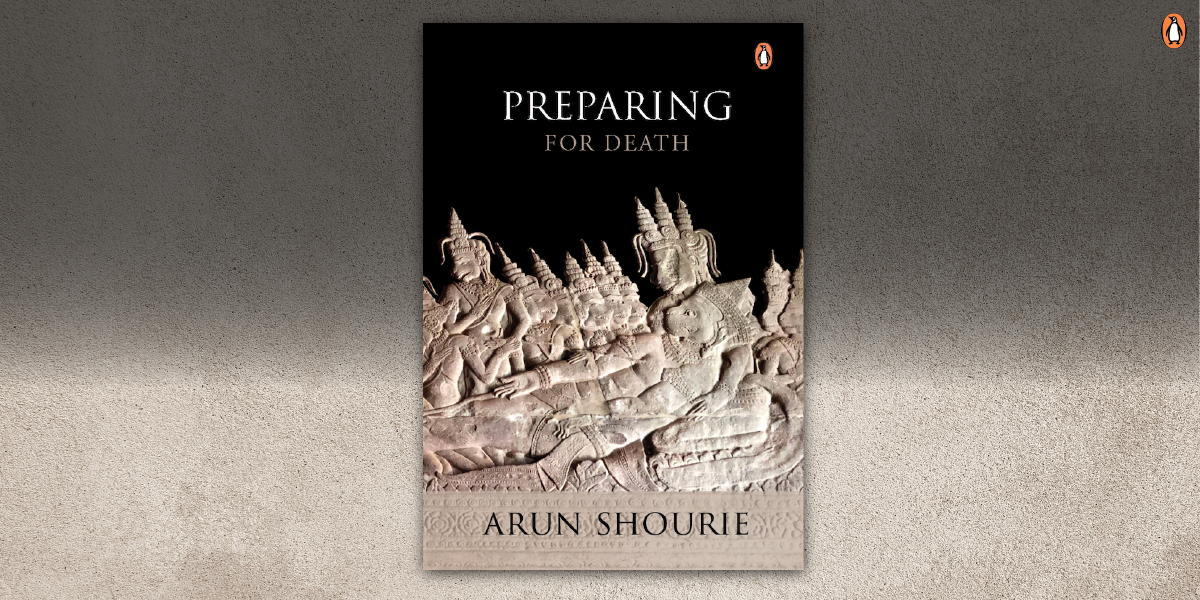The one certainty in life, the one appointment which each of us will just have to face, is the one for which we do the least to prepare-death.
Preparing for Death explores the questions that have puzzled humanity from the very beginning as evinced by the rituals, texts and philosophies that surround death. From the lives and last days of the Buddha, Ramakrishna Paramahamsa, Ramana Maharshi, Gandhiji, Vinoba; from our religious texts and teachings of great meditation masters; from santhara to sannyas , Arun Shourie explores all these, for their views on how to prepare oneself for the end.
Perhaps some of the most lucid and stark discussions as to the nature and inevitability of death exist in the teachings of the Buddha. With a lyrical look at the final discourses of the Buddha, Shourie offers guidelines on how to live so that one prepares oneself to face death with equanimity.
- Worldly troubles plague even the Perfect Ones
‘Ananda, I am now old,’ the Buddha says, ‘worn out, venerable, one who has traversed life’s path, I have reached the term of life, which is eighty . . .’ And pain is a constant blight: ‘It is only when the Tathagata withdraws his attention from outward signs, and by the cessation of certain feelings, enters into the signless concentration of mind, that his body knows comfort.
- Both in life, and in the preparation for death it is wise to withdraw the need for outside support, to removes one’s dependence on another’s existence and to find refuge within oneself
Therefore, Ananda, dwell with yourselves as your own island, with yourselves as your own refuge, with no other refuge; dwell with the Dhamma as your refuge, with no other refuge That is why, the Buddha counsels, it is well for a monk—and surely, for each of us—‘to review, from time to time, his own faults . . . another’s faults . . . his own attainments . . . another’s attainments’. And to dissolve by mindfulness the obsessions and ill-intentions that arise.
- A certain purity of thought and intention allows one to face death with equanimity.
And the Buddha draws a lesson from Devadatta’s fall, a lesson apt for the way we live our lives. Devadatta went to perdition, the Buddha says, because he had been overpowered by thoughts of gain and loss, of fame and obscurity, of honour and infamy; because he had been consumed by evil intentions and poisoned by evil friendship.
- Death invariably seems something that happens to other, so the first acceptance of the temporality of all things-including oneself
Ananda, have I not told you before: All those things that are dear and pleasant to us must suffer change, separation and alteration? So how could this be possible? Whatever is born, become, compounded, is liable to decay—that it should not decay is impossible.
- The idea of ‘preparing for death’ also encompasses an acceptance that there are no guarantees, no certainties as to when and where the final moment will occur. Thus our lives itself are ordered in a way that one is, by necessity-preparing for death.
As the Buddhist teachers say, even though we see death every other day, our general attitude is, ‘Yes, yes, I know I will die. But I won’t be dying this year, certainly not this week. In any case, not today.’ The Buddha placed great emphasis on reversing this complacence. He wanted us to always bear in mind: death is certain, but its manner, place, time are absolutely uncertain. He wanted us to internalize these facts, and order our lives accordingly.
- Death ultimately subsumes all possessions both material and immaterial.
Each of the ones now lying on the pyre or on those wretched rails had come empty-handed, each is going empty-handed. The assets they had acquired, the honours they had won, the services they had performed, the high positions they had held—none of these could save them, nor was any possession or honour accompanying them.
- Death is inescapable, even for the enlightened who have freed themselves from all material fetters, even for the Tathagata himself.
Even in the case of those Bhikkhus who are arahants, whose taints are destroyed, who have lived the holy life, done what had to be done, laid down the burden, reached their own goal, utterly destroyed the fetters of existence, and are completely liberated through final knowledge: even for them this body is subject to breaking up, subject to being laid down.
- Preparing for death is in itself a discipline-as the Buddha’s address to his monks at Vesali before departing for his final pilgrimage suggests.
Ripe I am in years. My life-span’s determined.Now I go from you, having made myself my refuge. Monks, be untiring, mindful, disciplined,Guarding your minds with well-collected thought. He who, tireless, keeps to law and discipline, Leaving birth behind will put an end to woe.







